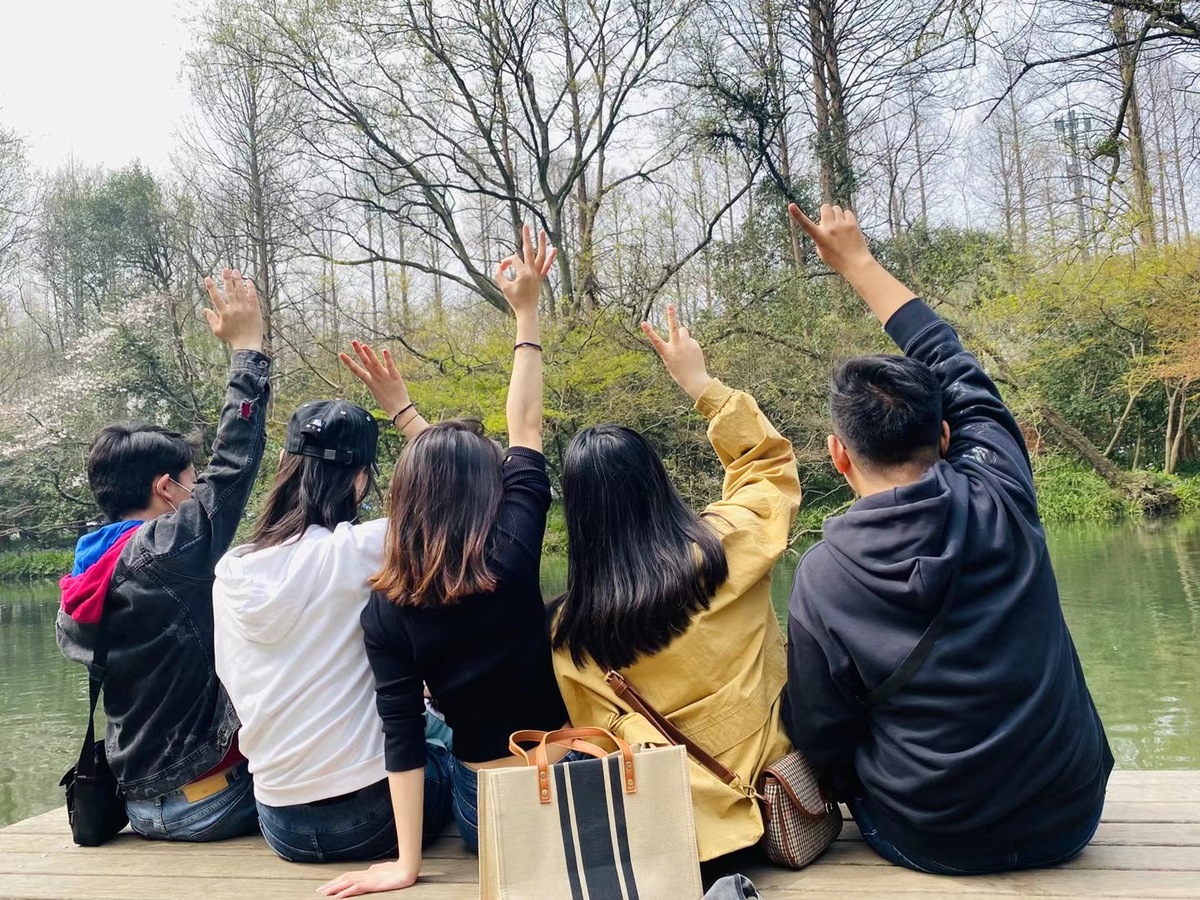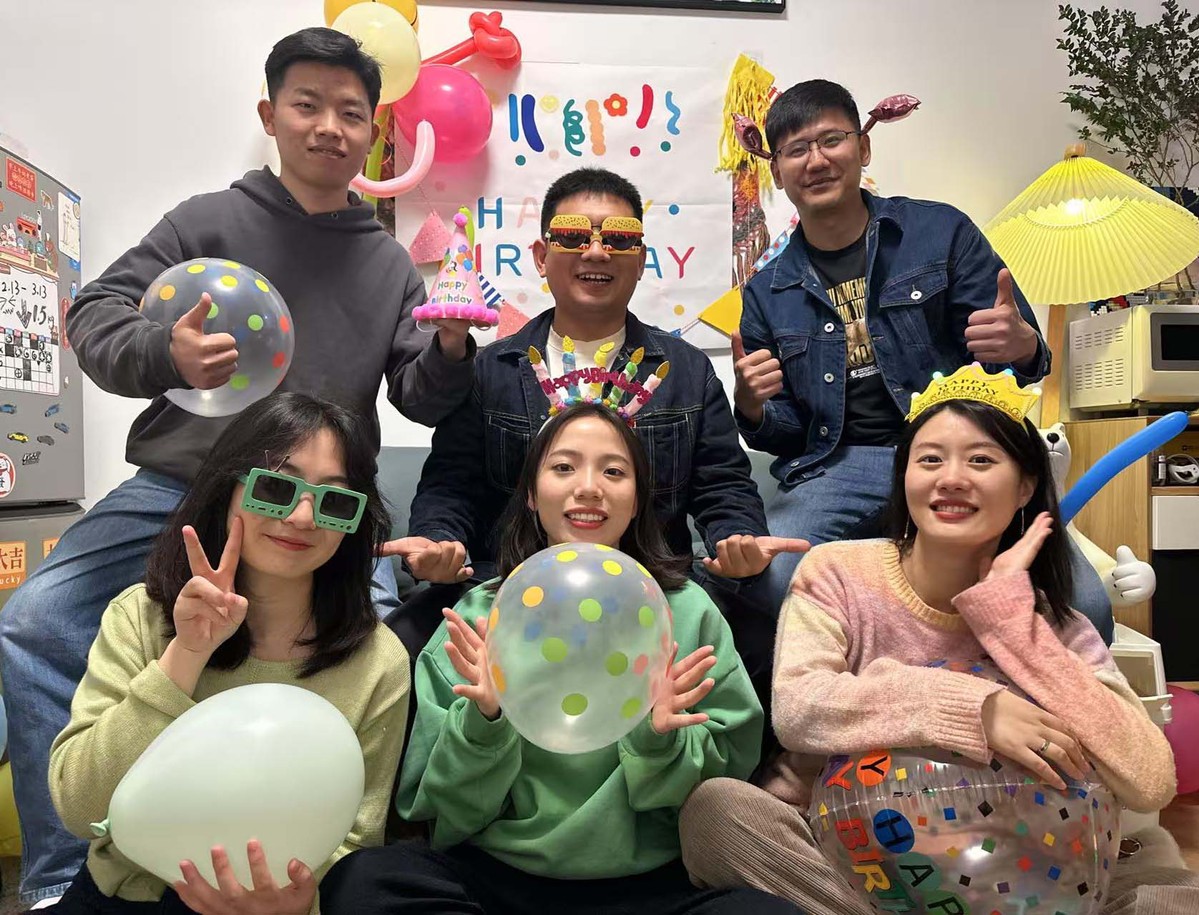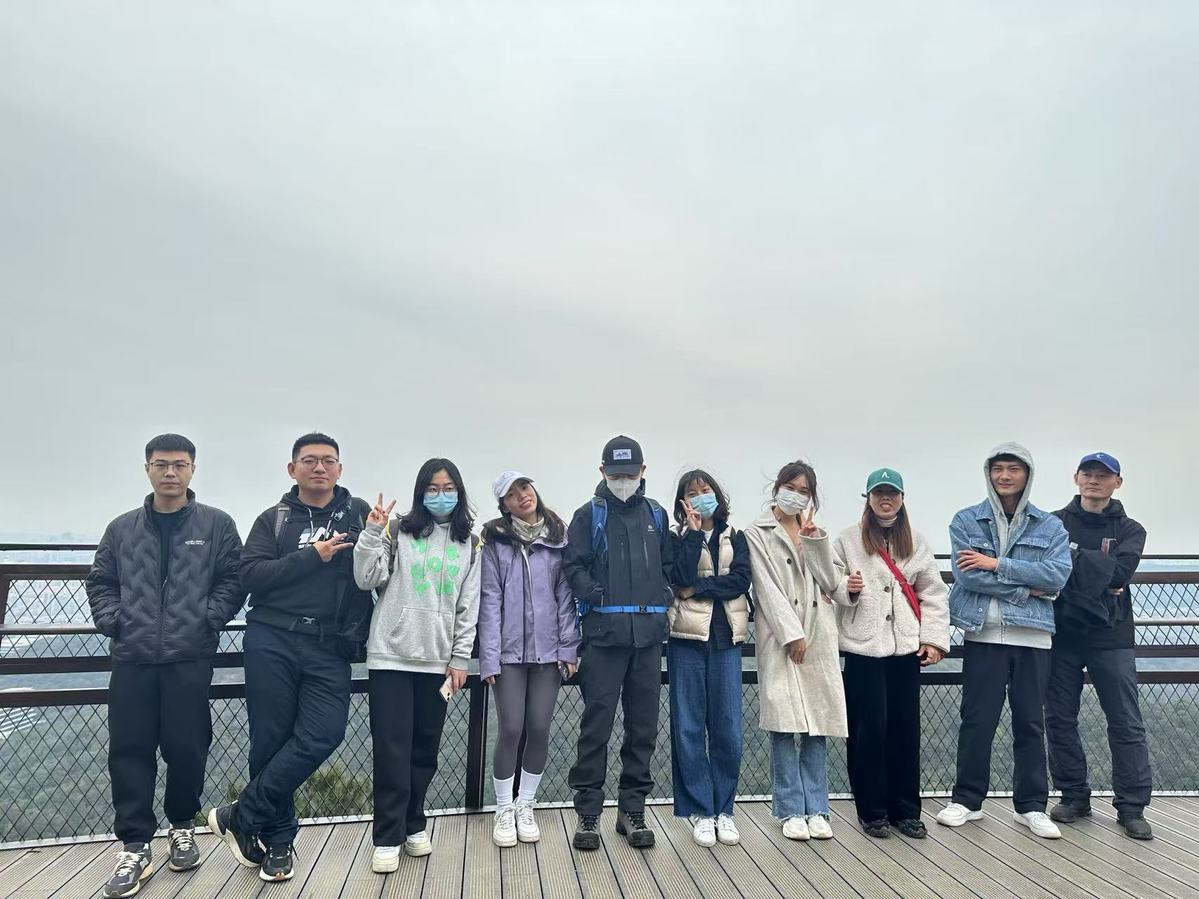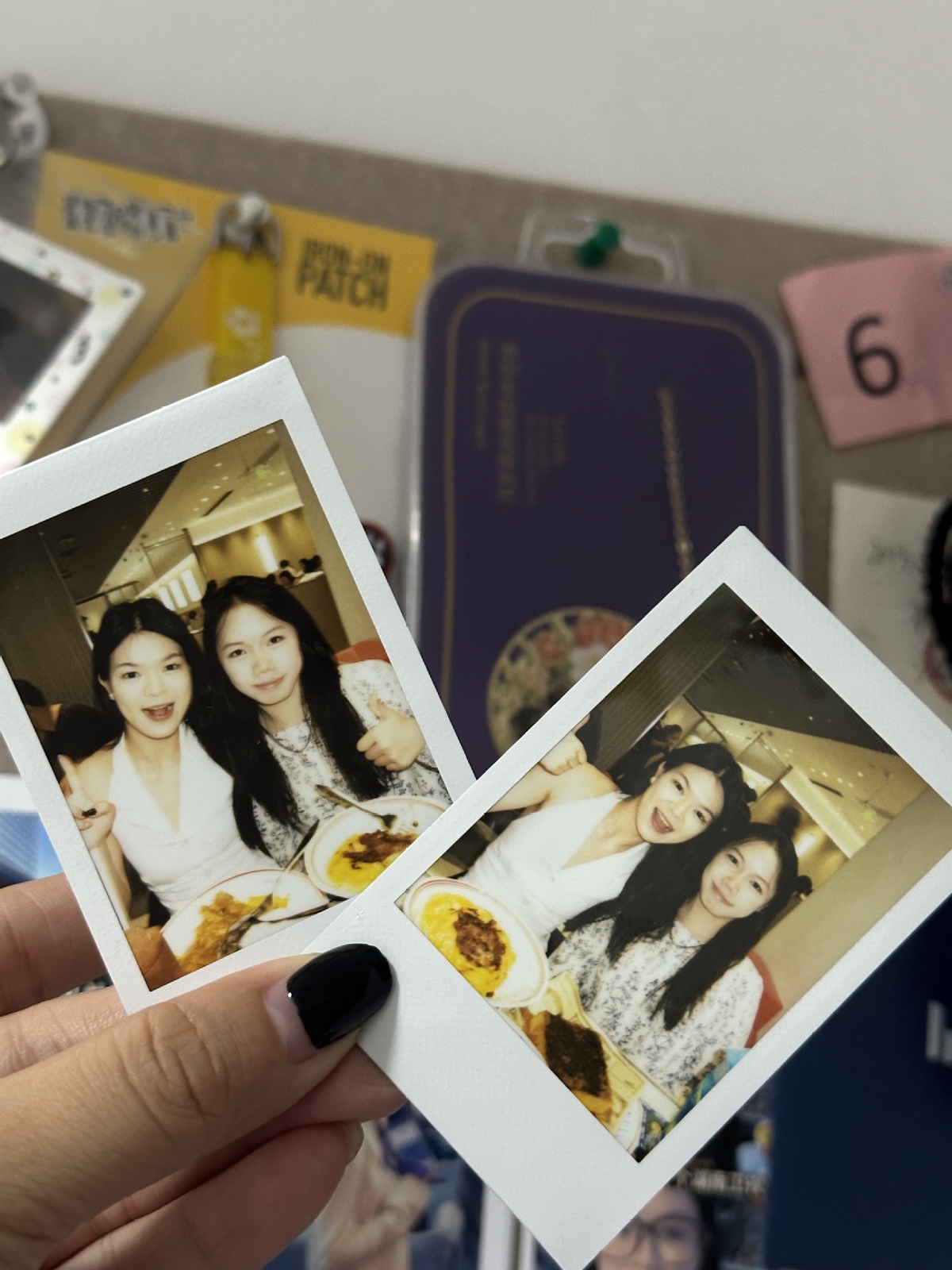
Lyu Xinmin and colleagues pose at a park in Hangzhou, Zhejiang province, in 2023. CHINA DAILY
As an influencer with more than 110,000 followers, Liu Yuwei, 23, wakes up to a stream of notifications. Before getting out of bed, she checks her social media, responds to friend requests, and sends a few emojis in reply to memes in her favorite group chat.
It's all part of her morning routine — a ritual that doesn't demand deep thought or emotional energy. For Liu, qing shejiao, or "light socializing", is how she navigates relationships, making quick, low-investment connections throughout the day.
By the time she sits down with her first coffee, she has already shared an article on WeChat Moments and given a "like" on a friend's post. These small, fleeting interactions — without deep emotional exchange or long-term commitment — define her social life.

Lyu (left) at a birthday party for one of her colleagues (front middle) in April 2023. CHINA DAILY
Liu doesn't feel the need to maintain constant communication with all of her friends, and she's comfortable with that.
"One of my best friends lives just a few blocks away, but we only meet up once a month. Instead, we comment on each other's posts or send funny messages. I don't expect anything more from it," she says. "It's just easier that way. I don't have to worry about being available all the time."
Liu's experience reflects the growing trend of light socializing, where casual, low-effort interactions, often digital, replace deeper, more traditional forms of connection. Unlike past generations, who relied on face-to-face meetups and long-term emotional investment, today's young people are embracing a more relaxed, noncommittal approach to socializing.
The rise of social media platforms like WeChat, Weibo, Red Note, and Douyin has made this shift even more pronounced. Young people can maintain broad social circles without the pressure of frequent in-person meetings or emotionally demanding conversations.
Yet, light socializing doesn't mean complete disconnection. Liu still meets up with friends and travels with them, but there's an emotional distance that makes these interactions feel more effortless.
"It's about being present without the pressure that often comes with close friendships," she explains.
Despite the seemingly superficial nature of these interactions, Liu believes digital connections can sometimes feel deeper than real-life friendships.
"The internet has given me the chance to meet people who truly resonate with me," she says. Many of her followers share personal stories with her, seeking advice or support — conversations that might never happen in real life.
One follower, a college girl struggling with depression, confided in Liu after watching a video where she spoke about overcoming personal challenges. Liu encouraged the woman to go out and learn something, such as painting. After becoming "online" friends for a year, the woman recovered and sent Liu a painting she had completed.
"It was a memorable and touching experience. In the digital world, people tell me things they may never share with their closest friends," she explains. "There's a kind of sincerity in these exchanges."
For Liu, light socializing isn't about avoiding real relationships — it's about filtering connections to find those who truly align with her energy. Through social media, she has formed friendships, built business connections, and even met her boyfriend. Their relationship began through shared interests at a summit for young professionals, evolving gradually without pressure or expectations.
"Light socializing is about finding people who share your energy. It filters out those who don't resonate with you and minimizes the pressure and burden of socializing," she explains. This process has helped her meet individuals who have contributed to both her personal and professional growth.

Xiao Yao (right) performs in a school drama. CHINA DAILY
Not everyone embraces light socializing, though. Xiao Yao, a 21-year-old university student from Beijing, prefers real-world interactions over digital ones.
"I'm not fond of chatting on WeChat," she admits. "Every time I hear the notification, I feel anxious — especially if it's someone I don't know well."
For Xiao, true socializing means face-to-face conversations, where she can read emotions and connect on a deeper level. She values moments where she can engage without the distractions of screens. "With close friends, we meet for meals or hang out together. I prefer that over maintaining online chats."
However, she acknowledges that light socializing has its benefits. "It's about choosing what works for you. Some people don't have the time or energy for deep friendships. Light socializing makes relationships more manageable."
Her family's dynamic reflects different approaches to socializing. Her father, who works in a state-owned enterprise, views relationships as functional — based on resource exchange and professional networking. Her mother, in contrast, nurtures a small circle of friends with whom she shares personal experiences and hobbies.
Though she uses social media, Xiao's engagement is intentional. Rather than chatting aimlessly, she shares meaningful moments — such as a video about a musical performance she likes — that sparks conversations with like-minded people.
She also heads a student theater at her university, where she does rehearsals and performs with other students who share a love for the theater.
"In those cases, social media does help form real connections," she says. "But the most fulfilling relationships are the ones that happen when we put down our phones and truly engage with the world."
To celebrate her 21st birthday in February, Xiao hosted an in-person gathering with 20 friends. "It was about the here and now — not the virtual world," she says.

Lyu (third from left) joins a hiking trip with outdoor enthusiasts she met online in Feb 2023. CHINA DAILY
In China, with the rising force of the young generation, their lifestyle trends are making headlines, which is especially true with the emerging new cultural, wellness, and tech-driven movements.
For example, saibo yangsheng (cyber health preservation), one of the lifestyle trends among young people, shows how they are increasingly focusing on health and wellness due to rising life pressures. It is a modern approach to wellness, where young people use traditional methods like baduanjin (a set of traditional exercises), or sanfu tie (herbal patches used in Chinese medicine in the middle of summer), alongside modern technology. They often engage in seemingly contradictory behaviors when it comes to health. They stay up late but at the same time, take time to soak their feet in warm water, which is a traditional relaxation technique. They drink bubble tea, a modern indulgence, but also choose not to add sugar to it, which reflects a healthier choice.
"I am one of those who live a life with saibo yangsheng and almost all of my friends enjoy this lifestyle," says Xiao. "I often stay up late at night and when I post a photo on my social media platforms, my friends would reply in seconds, giving me 'likes' or making comments, since they also haven't slept yet.
"Like qing shejiao and saibo yangsheng, that's how we are trying to balance the demands of modern life. We want to make friends but we find it challenging to maintain deep, time-consuming relationships. People work beyond standard hours and as a result, they stay up late to catch up on personal tasks, hobbies, or relaxation after work while still trying to care for their health," says Xiao.
"If someone asks me out for dinner on a Tuesday for the weekend, I start feeling stressed," Lyu Xinmin, 29, laughs as she explains her approach to socializing. She works in strategic planning for an automotive company in Guangzhou, Guangdong province, but most of her close friends are back in her hometown in Gansu province. Over the years, her way of socializing has shifted almost entirely online.
Growing up, Lyu's social life revolved around after-school hangouts — playing ping-pong, exchanging gifts, and spending time with friends. But in recent years, her friendships have transitioned online.
"At first, we used to call each other on the phone. Then it became WeChat. Now, it's mostly platforms like Douyin and Red Note, where I connect with more people, including strangers," she says, adding that the change of the way of socializing also resulted from leaving her hometown and the change of her jobs — from Hangzhou, Zhejiang province, to Guangzhou, which forced her relationship with friends to stay online.
She finds online communication easier, in fact, especially when it comes to expressing emotions. "Traditionally, Chinese people aren't great at verbalizing their feelings. Online, I can say whatever I want whenever I want, without worrying about being judged or seeing the other person's facial expressions. It takes away a lot of the pressure," she says.

Polaroid photographs of Liu Yuwei (left) and her friend. CHINA DAILY
Lyu recalls that when she first started working in Hangzhou, she didn't have a lot of friends. She wanted to attend concerts but didn't have friends to go with. So, she turned to Red Note and found a young woman who liked the same band.
"We didn't need to get to know each other — we just shared the same interest. That was enough to go together. Our relationship stayed at that level, and that was perfectly fine," says Lyu.
While living in Hangzhou, she used the same method to find hiking buddies, photography partners, and even volunteers for community projects. Whether it was a oneday hiking trip or a casual outing, these "social partners" provided companionship without the emotional burden of maintaining deep relationships. This type of connection — a flexible and purpose-driven form of socializing — is becoming increasingly common among young people.
She also noticed a shift in how she perceives emotional connection. In the past, friendship meant going out for meals, shopping together, and sharing experiences. Now, she finds emotional comfort in things like pets, collectibles and online interactions.
"Our parents' generation had to visit people's homes with gifts to maintain relationships. But for us, it's like how online shopping replaced physical stores — social media platforms fulfill our social needs now," she says.
Now, Lyu runs a career-focused account on Red Note, where she shares job advice and helps young women with resume reviews for free. Through this, she met another like-minded young woman who shares her rational approach to discussions.
"We eventually added each other on WeChat, and even though we've never met in person, we've developed a meaningful connection," she says.
Although Lyu still meets up with friends occasionally in Guangzhou, she no longer feels dependent on these interactions.
"Socializing for the sake of socializing feels like a burden — especially with people I don't have a deep emotional connection with," she says. For Lyu, socializing is an option, not a necessity.
In a world where online interactions are more prominent than ever, Lyu represents a growing mindset among young people. They don't reject socializing, but they also don't force intimacy. Whether through online communities, casual activity partners, or shared interests on social platforms, they find meaningful connections in ways that suit their lifestyles.
"Socializing should make you feel comfortable, not stressed," she notes.
The shift toward light socializing isn't just about preference — it's also a response to modern societal pressures. Dong Chenyu, an associate professor at Renmin University of China specialized in social media research, explains that young people today are navigating highly competitive environments.
"The pace of life is faster, and socializing has adapted to fit these demands," he says. "It's not necessarily a bad thing — it's just different from traditional expectations."
While older generations maintained structured, close-knit friendships, younger people favor digital connections that provide flexibility without heavy emotional investment. However, Dong warns that overreliance on light socializing can contribute to feelings of loneliness.
"People may find themselves surrounded by acquaintances but lacking deep emotional support," he explains. "There's a risk of mistaking digital engagement for true connection."
That said, he doesn't see light socializing as inherently negative. "It's a way of adapting to the digital age. Young people aren't rejecting deeper relationships — they're just prioritizing different types of connections.
"Light socializing is neither entirely good nor bad — it's a reflection of how relationships are evolving in a digital-first world. For some, it offers freedom from social obligations. For others, it risks diluting the depth of human connection," Dong says.